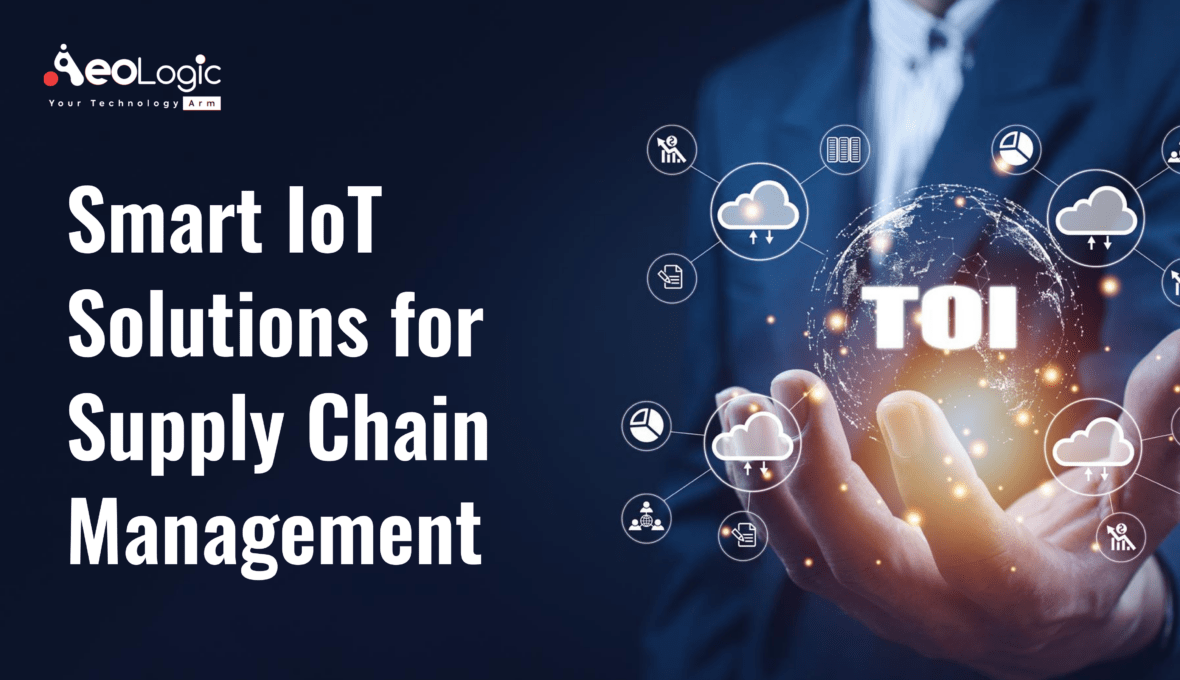Supply chain management (SCM) is a critical aspect of business operations, ensuring the seamless flow of goods and services from suppliers to end customers. In today’s fast-paced world, businesses are constantly searching for innovative ways to optimize their supply chains to stay ahead of the competition. One such game-changing technology is the Internet of Things (IoT). This article will explore how smart IoT solutions can revolutionize supply chain management and help businesses overcome their most pressing challenges.
Get in touch with us to know more about IoT Solutions.
The Role of IoT in Supply Chain Management
IoT solutions can play a significant role in enhancing supply chain management through real-time tracking and visibility, improved inventory management, and predictive maintenance.
Real-time Tracking and Visibility
IoT devices such as sensors, RFID tags, and GPS trackers provide real-time data on the location and condition of products throughout the supply chain. This data helps businesses monitor and manage their assets more effectively, improving overall supply chain visibility.
Improved Inventory Management
Smart IoT solutions enable businesses to manage their inventory more efficiently by tracking stock levels in real-time, reducing waste and overstocking. IoT-enabled devices can also automate reordering processes, ensuring that businesses always have the necessary inventory to meet customer demands.
Predictive Maintenance
IoT devices can help predict potential equipment failures by continuously monitoring and analyzing equipment performance data. This allows businesses to perform maintenance proactively, reducing downtime and minimizing disruptions to the supply chain.
Also Read: Role of the Internet of Things in Smart Manufacturing
Key Smart IoT Solutions in Supply Chain Management
There are several key IoT solutions that businesses can leverage to optimize their supply chain management, including RFID tags and sensors, GPS tracking systems, and smart warehouse solutions.
RFID Tags and Sensors
Radio Frequency Identification (RFID) tags and sensors are IoT devices that can be attached to products, pallets, or containers. These devices transmit data on the location, temperature, and other conditions of the products, providing valuable insights for supply chain managers.
GPS Tracking Systems
Global Positioning System (GPS) trackers are IoT devices that provide real-time location data for assets such as trucks, containers, and pallets. This information enables businesses to optimize routes, reduce transit times, and ensure timely deliveries.
Smart Warehouse Solutions
Smart warehouses leverage IoT devices and automation technologies to optimize storage, retrieval, and handling processes. By implementing IoT solutions, businesses can increase efficiency, reduce errors, and lower operational costs.
Also Read: How To Implement IoT in Your Business and Why It Matters?
Integrating IoT with Other Technologies
IoT solutions can be integrated with other cutting-edge technologies to further enhance supply chain management, including blockchain technology, artificial intelligence (AI), and machine learning, as well as edge computing.
Blockchain Technology
Blockchain technology can be used in conjunction with IoT devices to improve transparency, traceability, and data integrity across the supply chain. By creating an immutable and secure record of transactions, blockchain helps prevent fraud, reduce errors, and improve overall supply chain efficiency.
Artificial Intelligence and Machine Learning
AI and machine learning algorithms can analyze vast amounts of IoT-generated data to identify patterns, trends, and anomalies. This enables businesses to make data-driven decisions, optimize operations, and respond to changing market conditions more effectively.
Edge Computing
Edge computing refers to processing data close to the source (IoT devices) rather than sending it to a centralized data center. This approach reduces latency, improves data privacy, and enables real-time decision-making, which is crucial for efficient supply chain management.
Also Read: Role and Impact of IoT Technologies in the Education Industry
Benefits of Implementing Smart IoT Solutions
Implementing IoT solutions in supply chain management offers numerous benefits, including enhanced efficiency and cost savings, increased customer satisfaction, and better decision making.
Enhanced Efficiency and Cost Savings
IoT solutions can help streamline various supply chain processes, such as inventory management, transportation, and warehousing. This leads to increased efficiency and cost savings, as businesses can reduce waste, minimize stockouts, and optimize their use of resources.
Increased Customer Satisfaction
By providing greater visibility and control over the supply chain, IoT solutions enable businesses to deliver products faster, more accurately, and with fewer errors. This results in higher customer satisfaction and stronger brand loyalty.
Better Decision Making
IoT-generated data offers valuable insights into supply chain operations, allowing businesses to make informed decisions and continuously improve their processes.
Also Read: Here’s How IoT can Manage EV Transition in India
Challenges in Implementing IoT Solutions
Despite the numerous benefits, there are also challenges associated with implementing IoT solutions in supply chain management. These include data security and privacy concerns, integration with existing systems, and the need for skilled personnel to manage and maintain the IoT infrastructure. It includes:
- Data Security and Privacy Concerns: As IoT devices generate and transmit large amounts of data, businesses must address potential security vulnerabilities and ensure the privacy of sensitive information.
- Integration with Existing Systems: Integrating IoT solutions with legacy systems can be complex and require significant investments in time and resources.
- Skilled Personnel: Managing and maintaining an IoT infrastructure requires skilled professionals who understand both the technology and the specific needs of supply chain management.
- Scalability: As the number of connected devices and data volume increases, businesses must ensure that their IoT infrastructure is capable of scaling up to meet growing demands.
- Cost: Implementing IoT solutions can be costly, particularly when it comes to hardware, software, and ongoing maintenance expenses. Businesses must carefully consider the return on investment when adopting IoT technology.
- Interoperability: With the wide variety of IoT devices and platforms available, ensuring interoperability between different systems can be challenging.
- Regulatory Compliance: Businesses must stay informed of and comply with various regulations related to data protection, privacy, and security when implementing IoT solutions in their supply chain.
Final Thought
Smart IoT solutions have the potential to revolutionize supply chain management by improving visibility, enhancing efficiency, and enabling data-driven decision making. However, businesses must carefully consider the challenges and invest in the necessary infrastructure and expertise to fully realize the benefits of IoT technology.
Learn more about us by scheduling a free 60-minute call. Kindly connect with us.







